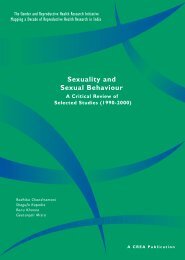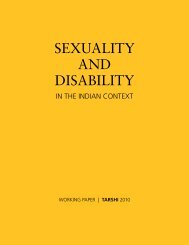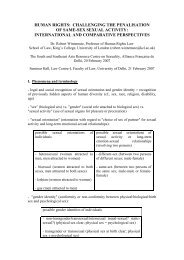People with Disabilities in India: From Commitment to Outcomes
People with Disabilities in India: From Commitment to Outcomes
People with Disabilities in India: From Commitment to Outcomes
Create successful ePaper yourself
Turn your PDF publications into a flip-book with our unique Google optimized e-Paper software.
• a second overarch<strong>in</strong>g policy issue <strong>with</strong> the Act relates <strong>to</strong> commitments which are subject <strong>to</strong><br />
the “limits of economic capacity and development” of the relevant authorities. The<br />
formulation represents an attempt <strong>to</strong> balance policy commitments and fiscal and <strong>in</strong>stitutional<br />
realities. 182 While the approach is reasonable, the Act fails <strong>to</strong> outl<strong>in</strong>e any process for<br />
determ<strong>in</strong><strong>in</strong>g broadly what are the appropriate levels of policies and <strong>in</strong>terventions which<br />
might be expected at different levels of economic development <strong>with</strong><strong>in</strong> <strong>India</strong>. This could not,<br />
of course, be a very precise process, but <strong>with</strong>out some <strong>in</strong>dication of what are reasonable<br />
expectations of states at different levels of economic development, it is difficult <strong>to</strong> know what<br />
constitutes reasonable compliance effort on the part of the authorities. As a result, what are<br />
justiciable rights <strong>in</strong> sections where this proviso is used rema<strong>in</strong>s quite uncerta<strong>in</strong>. The<br />
uncerta<strong>in</strong>ty is significant, as this approach is used <strong>in</strong> important sections such as identification<br />
of PWD, prevention and treatment of disability, and access rights of PWD.<br />
In the absence of a process for benchmark<strong>in</strong>g reasonable performance by states on the<br />
cont<strong>in</strong>gent entitlements of the Act, the courts have become the ma<strong>in</strong> po<strong>in</strong>t of reference for<br />
PWD <strong>to</strong> enforce performance by governments. In this respect, the courts have sought <strong>to</strong><br />
promote the rights of PWD <strong>in</strong> a variety of areas. 183 The courts have tried <strong>to</strong> balance PWD<br />
entitlements <strong>with</strong> fiscal concerns. However, the resources and time needed <strong>to</strong> access the<br />
courts effectively are significant, and are likely <strong>to</strong> exclude many PWD.<br />
• the above po<strong>in</strong>t raises the wider one that the Act’s entitlements and commitments are<br />
supported by a weak enforcement mechanism. The <strong>in</strong>stitution mandated <strong>with</strong> moni<strong>to</strong>r<strong>in</strong>g<br />
compliance <strong>with</strong> the Act – the Office of the Commissioner – has weak powers. The<br />
Commissioners’ office has authority <strong>to</strong> look <strong>in</strong><strong>to</strong> deprivation of PWD rights and onimplementation<br />
of various rules, laws etc. which have been developed <strong>to</strong> promote the welfare<br />
and rights of PWD. The fundamental limitation of the office is that its only legal sanction<br />
<strong>in</strong> case of a breach is <strong>to</strong> “take up the matter <strong>with</strong> the appropriate authorities”. The Office<br />
does not itself have enforcement powers of a court or adm<strong>in</strong>istrative tribunal. It can and does<br />
make orders, but can not enforce compliance. As such, its effective powers are either<br />
“nam<strong>in</strong>g and sham<strong>in</strong>g” or encourag<strong>in</strong>g referral <strong>to</strong> the court system. While these have been<br />
effective remedies <strong>in</strong> some cases, there are clear limitations. This issue is discussed <strong>in</strong> the<br />
<strong>in</strong>stitutions section.<br />
• the overall approach of the Act has rather limited roles for ac<strong>to</strong>rs outside the core<br />
adm<strong>in</strong>istrative framework, <strong>in</strong>clud<strong>in</strong>g NGOs/DPOs, civil society, PWD themselves and PRIs.<br />
There is no explicit role for PRIs mentioned, though the Act was passed after the 73 rd<br />
Constitutional amendment. With respect <strong>to</strong> the NGO sec<strong>to</strong>r, it is mentioned at several po<strong>in</strong>ts<br />
as either a po<strong>in</strong>t of consultation (e.g. on formulation of PWD rehabilitation policies) or as a<br />
potential implementer (e.g. on disability research and tra<strong>in</strong><strong>in</strong>g of teachers). However, the<br />
overall policy and delivery model rema<strong>in</strong>s a rather traditional adm<strong>in</strong>istratively-driven<br />
mechanism, <strong>with</strong> limited sense of genu<strong>in</strong>e partnership <strong>in</strong> policy development and service<br />
delivery between the public and non-public sec<strong>to</strong>rs. Perhaps most notable of all is that<br />
DPOs are not mentioned <strong>in</strong> the Act at all, nor any obligation for governments <strong>to</strong> consult<br />
directly <strong>with</strong> PWD when develop<strong>in</strong>g policies, design<strong>in</strong>g <strong>in</strong>terventions or moni<strong>to</strong>r<strong>in</strong>g<br />
performance. The assumption of the Act appears <strong>to</strong> be that disability NGOs will act as<br />
conduits for PWD views and action.<br />
182 The approach is not uncommon <strong>in</strong>ternationally. A number of rights under the UN Convention on<br />
Economic, Social and Cultural Rights are framed <strong>in</strong> a similar cont<strong>in</strong>gent manner.<br />
183 The case law and comparative <strong>in</strong>ternational jurisprudence is very well outl<strong>in</strong>ed <strong>in</strong> Human Rights Law<br />
Network, op.cit.<br />
-125-










